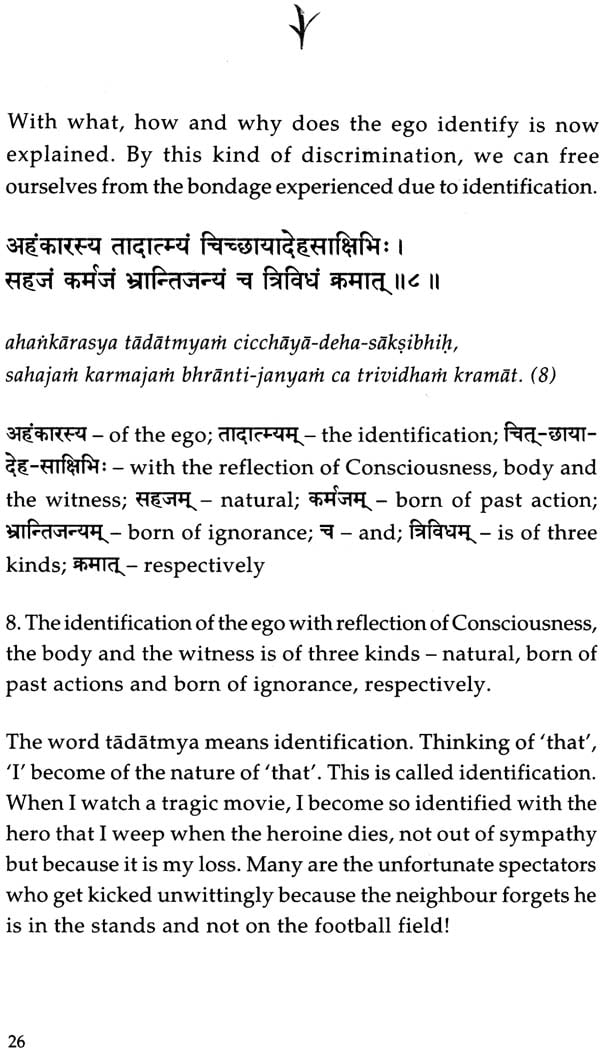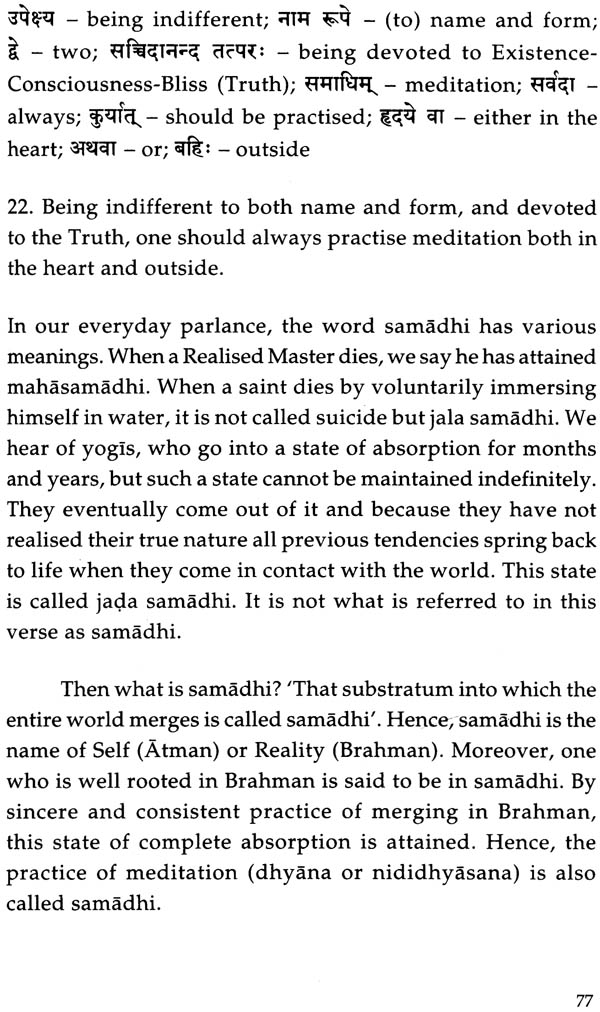
Drg Drsya Viveka (Commentary by Swami Tejomayananda) ( Sanskrit Text, Transliteration, Word-to-Word Meaning, Translation and Detailed Commentary)
Book Specification
| Item Code: | IDI014 |
| Author: | Commentary in Hindi by Swami Tejomayananda and Translated into English by Swamini Vimalananda |
| Publisher: | CENTRAL CHINMAYA MISSION TRUST |
| Language: | Sanskrit Text, Transliteration, Word-to-Word Meaning, Translation and Detailed Commentary |
| Edition: | 2020 |
| ISBN: | 9788175971264 |
| Pages: | 100 |
| Cover: | Paperback |
| Other Details | 8.5" X 5.5" |
| Weight | 140 gm |
Book Description
A man walking along the sidewalk suddenly slips and mourns over his own death since he sees his shadow being run over by a truck. This is surely a case of mistaken identity. In our case too, the Seer(Self) and the seen(body) seem to have become one. We think ‘I am the body’ and consequently we suffer.
Through Drg Drsya Viveka, Adi Sankaracarya helps us ascertain who we are and guides us in meditation so that we can realise our true nature of unconditional Bliss and end all sorrows for all times.
Pujay Guruji Swami Tejomayananda’s commentary makes this process a vivid and joyful experience.
There are millions of people living in this world. From the spiritual standpoint, they can be categorized into three distinct groups:
1) Those ignorant of the Truth (ajfianl).
2) Those wanting and striving to know the Truth (jijnasu).
3) And those who know the Truth (jnani).
All the three have their own ways of viewing the world. The ignorant one says that the world is real since it is perceived by him, the seeker pauses to think if it is so, and the man of knowledge realises the illusory nature of the world by knowing his own true Nature. Those in complete ignorance or knowledge have no doubts, but a seeker is plagued by uncertainties and inquires further. This is seen in all walks of life.
From Biblical times, in the West, the earth was believed to be flat with the sun revolving around it. The scientist's mind probed into this accepted perception. However, such research was considered foolhardy by the masses. The conclusion that the earth was a globe revolving around the sun shocked the Church. The scientist was prosecuted and his conclusions were labelled as blasphemous. However, we now accept the movement of the earth as general knowledge.
An ordinary example will further elucidate the point. A millionaire wants to give his one and only, young and beautiful daughter in marriage to an unintelligent and unemployed young man. The young man is confused and seeks advice from his friends. The first friend says that the marriage should take place without a second thought, 'After all, the girl's father is rich'. The second advises caution, 'Money and beauty are not everything in life. May be the girl has some unseen deformity or some terminal disease. It is better to inquire and think twice before accepting the proposal'. The third friend having known the millionaire for years gives a definite answer, whatever it may be, enumerating the pros and cons of the proposition.
Similarly, with regard to our own Self and Its nature, we find different notions entertained by the ignorant, the seeker and the Man of Knowledge. Sri Sarikaracarya in Vivekacuddmani (160) says:
deho 'bamityevajadasya buddhih
deheca jive vidusastvahandhih, viveka vijndnavatomahdtmanah
brahmdahamityeva matih saddtmani.
'The dull-witted man thinks - I am the inert body. The intelligent seeker thinks he is the transmigrating jlva. However, the great Man of Realisation knows himself to be the Infinite Truth.'
Vedantic texts like Drg Drsya Viveka are not addressed to a Realised Master since he already knows the Truth. Even if he reads it, he does not have to strive to understand and realise the deep significance of the statements therein. The words only reveal his direct experience of the Truth. He, therefore, revels in the Blissful Self.
Nor is this knowledge meant for an ignorant man who remains totally engrossed in sense enjoyment. He does not see the necessity of this knowledge in his normal scheme of life of getting a job, a wife, a car and so on. His life goes on with its petty joys and sorrows, jubilations and depressions, striving and enjoying. His question is - 'Since this knowledge does not guarantee worldly or other-worldly pleasures, why should I seek it?'
Arjuna too was of this opinion before the Mahabharata War. His entire life was spent in learning warfare techniques and acquiring assorted weapons from Indra, Siva and others, with an aim to fight the Kauravas and get back his lost kingdom. During the twelve long years spent in the forest, not once did Sri Krsna tell Arjuna, "Neither of us has anything much to do, so let us discuss Self-Knowledge." Sri Krsna knew fully well that Arjuna would have said that he would rather learn war strategies and strive to obtain more wealth and weapons, than waste time in philosophic discussions. Men preoccupied with worldly achievements are not receptive to Self-Knowledge. Only when Arjuna realised that despite his brilliant career as a warrior and equipped with an army of friends, relations and supporters, he was unequipped to face the situations in life, did he approach Sri Krsna for this Knowledge. Lord Sri Krsna, thereafter, blessed him with the Knowledge we now know as the Bhagavad Gitd.
An intelligent man living in the world must surely realise that there is something more to life than acquiring things and enjoying them, forming relations and breaking them. This cannot be the ultimate aim of human life. Such a person cannot thereafter blindly indulge in sense pleasures because he knows their futility. But since he does not know the Self, he is pulled apart by the opposite forces,' both from within and around him. His mind pulls him towards pleasures, yet his intellect rejects them. His friends and relations draw him into their circle of affection and expectations, yet he revolts, shying away from their overtures. He is not happy with people the way they are, nor are they happy with the way he thinks. Sarikaracarya advises such a seeker who has gained a measure of detachment to approach a Guru for Self-Knowledge.
True and lasting detachment results only from discrimination. Having discriminated the Real from the unreal, the capacity to hold on to the Real and give up the unreal is called detachment. It is to be noted that detachment (vairagya) is not the absence of attachment (raga), nor its opposite. The antonym for attachment is dislike, hatred or revulsion (dvesa) and dvesa is not vairagya. When due thought is given, man observes that joy and sorrow are not in anything external, so he does not get attached nor does he hate any thing or being. The absence of the pairs of opposites in the mind due to such analysis is true detachment.
Why should a man of detachment and discrimination approach a Guru? We can understand every object in the universe, including our mind and its functioning, with our intellect. Self-Knowledge not being in the domain of the intellect cannot be known, unless indicated by a Guru.
The Mundaka Upanisad (1.2.12) encapsulates the above thoughts saying:
pariksya lokdn karmacitdn brdhmano
nirvedamdydn-ndstyakrtab krtena,
tadvijndndrtbam sa gurum-evdbhigacchet
samitpdnih srotriyarn brabmanistbam.
'Having examined the worldly pleasures acquired by action, the wise man gets detached from them since the Eternal cannot be gained by actions. Therefore, to attain That, with firewood in his hands, he should humbly approach the Guru who is well versed in Scriptures and is a Man of Realisation.'
What should one ask the teacher? In Kenopanisad (1.1) the students put forth the following question:
kenesitam patati presitam manab
kena prdnab prathamab praiti yuktab,
kenesitam vdcamimdm vadanti
caksub srotrarh ka u devo yunakti.
'Propelled and controlled by what does the mind fall to its objects? Impelled by what does the pranah function? Inspired by what does the tongue speak words? And what Conscious Principle enlivens the eye and ear?'
What propels the mind? We believe it is the speech or words. My words create thoughts in your mind. If I ask you to think of your mother, your thoughts rush to her form and qualities. And what propels my speech? It is the mind. And what propels the mind? If we say speech, then we are faced with the paradox of mutual dependence. Mind is propelled by speech which is propelled by the mind! There must be a factor other than the two that propels both. What is it?
The student must have an intense desire to know the Truth. The best student wants to know It 'here and now'. The mediocre says 'as early as possible'. The dull one says 'later in life or maybe in another life'. The Guru tests the sincerity of the student who approaches him. In Kathopanisad, we find young Naciketas being tempted by the Guru, Lord Death, with money, a kingdom and beautiful women. Naciketas remains undaunted and immune retorting, 'You may keep your pleasure all for yourself.' He wants nothing but the Truth and is ready to face death in order to gain it. Indeed, such a student and teacher are rare!









